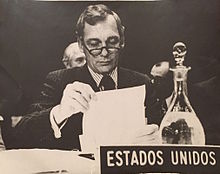Robert White (ambassador)
| Robert E. White | |
|---|---|
 |
|
| United States Ambassador to Paraguay | |
|
In office November 30, 1977 – January 27, 1980 |
|
| President | Jimmy Carter |
| Preceded by | George W. Landau |
| Succeeded by | Lyle Franklin Lane |
| United States Ambassador to El Salvador | |
|
In office March 11, 1980 – February 1, 1981 |
|
| President | Jimmy Carter |
| Preceded by | Frank J. Devine |
| Succeeded by | Deane R. Hinton |
| Personal details | |
| Born |
September 21, 1926 Melrose, Massachusetts, U.S. |
| Died | January 14, 2015 (aged 88) Arlington, Virginia, U.S. |
| Nationality | United States of America |
| Alma mater | Saint Michael's College |
| Occupation | Diplomat |
Robert Edward White (September 21, 1926 – January 14, 2015) was an American career diplomat who served as US Ambassador to Paraguay (1977–1980) and to El Salvador (1980–1981). He then became president of the Center for International Policy.
He was born in born in Melrose, Massachusetts. White served in the US Navy from 1944 to 1946, and after the war benefitted from the G.I. Bill. He graduated from Saint Michael's College in 1952, and after a Fulbright Scholarship graduated from The Fletcher School of Law and Diplomacy in 1954.
White died at a hospice on January 14, 2015, aged 88, due to bladder and prostate cancer. He was married to Mary-Anne White and had 5 grown children and 3 grandchildren.
Joining the United States Foreign Service in 1955, White served in a variety of positions at the State Department and in US delegations, primarily in Latin America. Postings included Colombia, Ecuador, Honduras and Nicaragua. From 1968 to 1970 he served as Peace Corps deputy regional director and then regional director, for the Latin America region. From 1975 to 1977 he was Deputy U.S. Permanent Representative to the Organization of American States. In October 1977 he was nominated by President Jimmy Carter as US Ambassador to Paraguay.
On March 6, 2001, The New York Times reported the existence of a recently declassified 1978 cable from Robert White, at the time the U.S. ambassador to Paraguay. Professor J. Patrice McSherry of Long Island University described the discovery as "another piece of increasingly weighty evidence suggesting that U.S. military and intelligence officials supported and collaborated with Condor as a secret partner or sponsor".
...
Wikipedia
